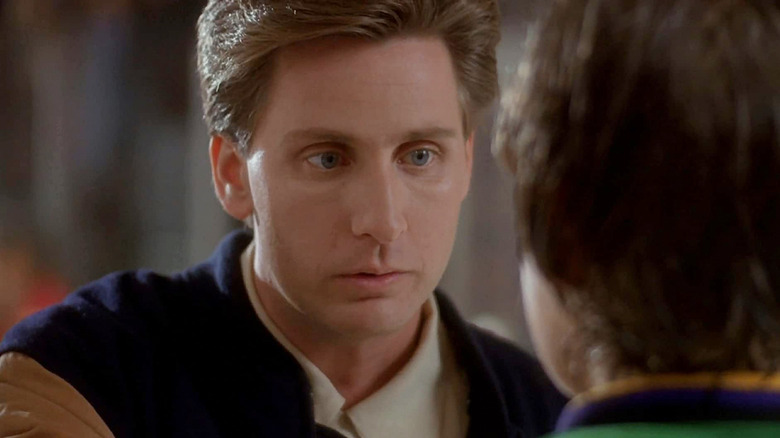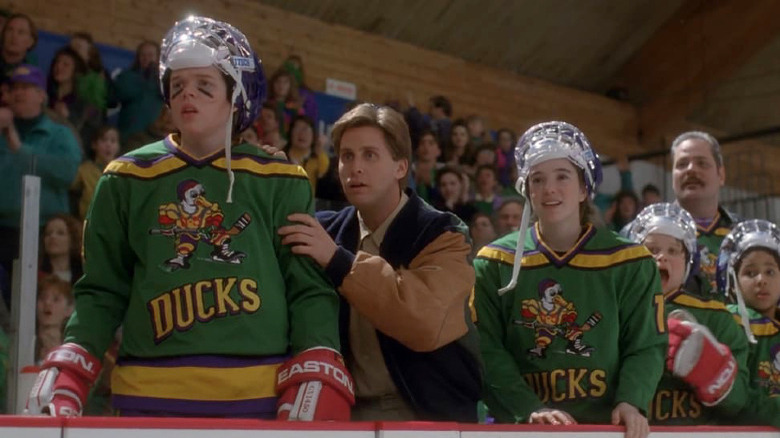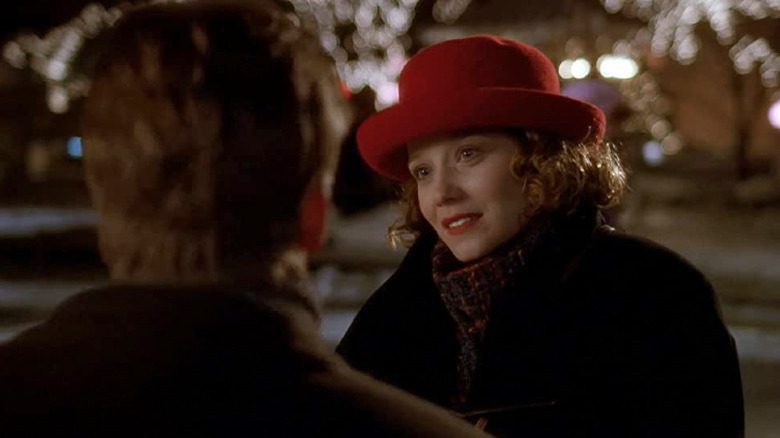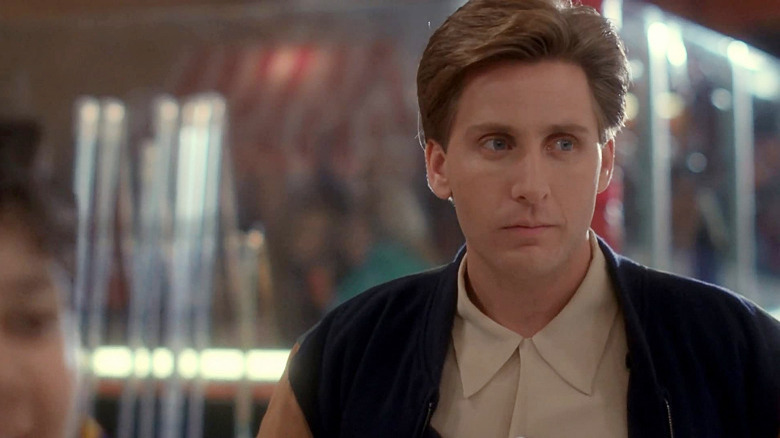The Mighty Ducks' Original Script Was Too Dark For Disney's Standards
I have vivid memories of seeing 1992's "The Mighty Ducks" for the first time in theaters at a young age. It was a cold, rainy day, and I recall passing by the cardboard cutout for "Bram Stoker's Dracula," which I found both startling yet oddly entrancing. My family was running a little late after waiting in line to buy tickets (this truly was a lifetime ago), so the film had already begun by the time we made our way into the auditorium. It was only later that I saw the movie's opening credits, which are intercut with a solemn flashback to the young Gordon Bombay (who's played by Emilio Estevez as an adult) missing a championship game-deciding penalty shot while playing for the Hawks.
Revisiting the film in 2021, I was pleased to see how well it holds up when compared to my memory of watching it as a child. The hockey scenes are crisply-shot and clearly-edited, capturing the excitement of being on the ice while retaining the scrappy feel of a game being played by kids. But more than that, it takes the grown-up Bombay's personal journey quite seriously without allowing its heavier emotions to overwhelm the movie's family-friendly vibe. He is, after all, haunted by his forsaken dreams and the toxic lessons imparted upon him by his old Hawks coach and bad father-figure, Jack Reilly ("My Cousin Vinny" star Lane Smith in a turn that's either over-the-top or maybe a little too realistic). It's why I'm not surprised to learn "The Mighty Ducks" writer Steven Brill had a darker vision for the film prior to Disney buying his script.
A hockey film 'seemed like a good thing to do'
"I had an agent, a small agent who looked at the script and tried to put it out there in the marketplace, and it didn't sell," explained Brill, speaking with TIME for the outlet's oral history of the "Mighty Ducks" film trilogy in 2014. He added that it was "very lucky" the script got picked up by Disney, having tapped into an idea that then-CEO Michael Eisner had "in the back of his mind" at the time.
It was under Eisner's watch as President and Chief Operating Officer that Paramount Pictures released "The Bad News Bears," the hit 1976 sports comedy that helped to popularize the formula that Brill would draw upon for his "Mighty Ducks" script (a down-on-his-luck guy is hired to coach a ragtag team of underdogs who teach him valuable life lessons, and vice versa). By the time he started writing it, hockey was enjoying a surge in popularity in the U.S., partly fueled by the U.S. men's hockey team's upset victory over the Soviet Union's team at the 1980 Winter Olympics. The "Miracle on Ice," as it's known, would later inspire Disney and Gavin O'Connor's 2004 sports drama "Miracle." At the time, however, hockey films were few and far between, save for rarities like George Roy Hill's R-rated 1977 comedy "Slap Shot."
As Eisner recalled in his conversation with TIME:
"We had made 'The Bad News Bears' at Paramount — we'd made a lot of sports films. And a hockey film seemed like a good thing to do. I was following my sons around in hockey, so I understood about junior hockey and I understood about professional hockey, and I certainly understood about California hockey and places where it wasn't exactly, you know, like Boston hockey and stuff like that. So I understood the milieu, let's put it that way."
Brill's earlier script was 'much darker'
Brill noted that the "Mighty Ducks" script he wrote pre-Disney was "much darker" than what made it onto the screen. That's not to say it would've lent itself to an R-rated film ("There weren't murders or anything," Brill clarified), but there was more "adult romance." Some of that would make its way into the actual movie with the romantic sub-plot involving Bombay and single-mom Casey Conway (Heidi Kling), whose young son Charlie (Joshua Jackson) serves as the film's co-lead. Brill's early draft similarly began with Bombay being arrested for a DUI and being sentenced to community service by coaching the Ducks (who are only known at that point as the District 5 team), just like in the final version. "I don't think [that plot point] would hold up right now in a Disney movie," said Brill.
A good deal of the broader comedic gags in "The Mighty Ducks" — the "having-sex-with-your-mother jokes in there and flatulence jokes, and guys [who] are getting hit in the nuts," to quote Brill directly — were added later at the behest of producer Jordan Kerner, in an effort to bring it closer to what Disney executives believed audiences expected from their movies at the time. Rewatching the film, I can attest that some of those jokes feel a lot more slapped-on than others, which makes sense because, by the sound of it, they were. On the whole, though, it does a pretty decent job of sustaining what Brill described as "a mix of very serious character-driven story and then broad humor."
Could the 'darker' version of Mighty Ducks happen today?
After "The Mighty Ducks" became a box office success, Brill returned to pen the sequel film, 1994's "D2: The Mighty Ducks," before serving as a co-writer on 1996's "D3: The Mighty Ducks." Then, 15 years later, he would produce and co-develop a revival of the franchise in the form of the Disney+ series, "The Mighty Ducks: Game Changers." Compared to the movie that started it all, the show's humor is squeaky-clean and its story is much more focused on the kid hockey players than the grown-ups in their lives (although the latter do have sub-plots of their own).
Is that a bad thing? It depends on how you look at it. "Game Changers" was designed for Disney+ from the get-go, so you don't get the somewhat-wobbly mix of serious character drama and slapstick humor of the first "Mighty Ducks" film. That also means it lacks the movie's emotional depth and is sometimes guilty of speaking down to its target audience, rather than trusting they can handle more mature stuff in-between the strictly kid-friendly moments. For better or for worse, though, it's the only take on the property that the Mouse House seems comfortable putting out there right now.
Kerner, for his part, argued that Brill's darker vision for "The Mighty Ducks" could absolutely get made at the time he gave the interview, just not as a Disney movie:
"In those days, there weren't many little indie films. So as a smaller indie film, I think that a darker script would have been terrific. And had there been more language and it was more 'Little Miss Sunshine,' I think that could have been very successful. It just wouldn't have been a Disney movie. And here we were in something that we felt we could tell as a dramatic story, and we didn't want to digress from that. We didn't whitewash it — we just didn't show certain things. It was more lyrical, what Steve ultimately wrote."
That's arguably still the case in 2022, though the film would probably have just as good a chance at being acquired by a streaming service than an indie studio in the current market. Still, if there's a writer out there with an idea for a darker "Mighty Ducks"-style sports movie in the vein of "Little Miss Sunshine," now's the time to get quacking. Er, cracking.



